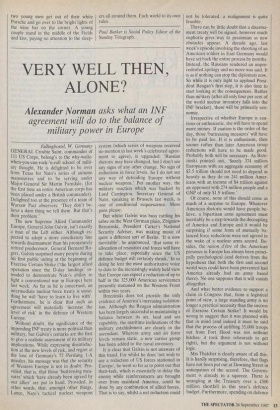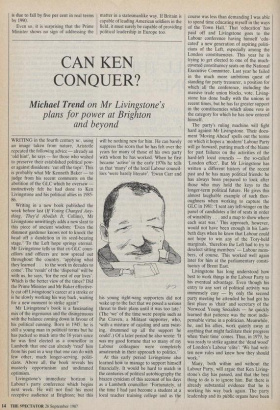VERY WELL THEN, ALONE?
Alexander Norman asks what an INF
agreement will do to the balance of military power in Europe
Fallingbostel, W. Germany GENERAL Crosbie Saint, commander of 111 US Corps, belong's to the why-waltz- when-you-can-rock-'n-roll school of milit- ary thought. He is delighted to be over from Texas for Nato's series of autumn manoeuvres and to be serving under Major-General Sir Martin Farndale; (for the first time an entire American corps has been placed under a British commander). Delighted too at the presence of a team of Warsaw Pact observers: 'They don't be- lieve a darn thing we tell them. But that's their problem.'
The new Supreme Allied Commander Europe, General John Galvin, isn't exactly a man of the Left either. Although ex- pected to adopt a more conciliatory line towards disarmament than his prematurely retired predecessor, General Bernard Ro- gers, Galvin surprised many people during his first public outing at the beginning of Exercise Certain Strike (`the largest allied operation since the D-day landings' in- tended to demonstrate Nato's ability to fight a conventional war in Europe) here last week. As far as he is concerned, an intermediate nuclear force treaty is some- thing he will 'have to learn to live with'. Furthermore, he is clear that such an agreement will materially 'increase the level of risk' in the defence of Western Europe.
Without doubt, the significance of the impending INF treaty is more political than military, but Galvin's remarks are the first to give a realistic assessment of its military implications. While expressing dissatisfac- tion at the new levels of risk, and regret at the loss of Germany's 72 Pershing 1-A missiles, his message was that the security of Western Europe is not in doubt. Pro- vided, that is, that those 'buttressing mea- sures' which 'have already been agreed by our allies' are put in hand. Provided, in other words, that, amongst other things, Lance, Nato's tactical nuclear weapons system (which series of weapons received no mention in last week's celebrated agree- ment to agree), is upgraded: 'Russian rhetoric may have changed, but I don't see any signs of any other change. No sign of reductions in force levels. So I do not see any way of defending Europe without nuclear weapons.' Put another way, the military reaction which was backed by Lord Carrington, Secretary General of Nato, speaking in Brussels last week, is one of conditional acquiescence. More guns please.
But whilst Galvin was busy rattling his sabre on the West German plain, Zbigniew Brzezinski, President Carter's National Security Adviser, was making music of quite a different sort of Berlin. 'It is now inevitable', he announced, 'that some re- allocation of resources and forces will have to take place, especially since the US defence budget will certainly shrink.' In so doing he lent the most authoritative voice to date to the increasingly widely held view that Europe can expect a reduction of up to half in the 325,000 American servicemen presently stationed on the Western Front within two years.
Brzezinski does not provide the only evidence of America's increasing isolation- ism. Although the Reagan administration has been largely successful in maintaining a balance between its air, land and sea capability, the maritime inclinations of the military establishment are clearly in the ascendant. Whereas army and air force levels remain static, a new carrier group has been added to the naval inventory.
It is clear that Galvin is not unaware of this trend. For whilst he does 'not wish to see a reduction of US forces stationed in Europe', he went so far as to point out that their-task, which is essentially to delay the enemy while reinforcements are brought over from mainland America, could be done by any combination of allied forces. That is to say, whilst a net reduction could not be tolerated, a realignment is quite feasible.
There can be little doubt that a disarma- ment treaty will be signed, however much euphoria gives way to pessimism as new obstacles appear. A decade ago, last week's episode involving the shooting of an American soldier in East Germany would have set back the entire process by months. Instead, the Russians rendered an unpre- cedented apology and no more was said. It is as if nothing can stop the diplomats now. So while it is only right to applaud Presi- dent Reagan's first step, it is also time to start looking at the consequences. Rather than military (after all only four per cent of the world nuclear inventory falls into the INF bracket), these will be primarily eco- nomic.
Irrespective of whether Europe is cau- tious or enthusiastic, she will have to spend more money. If caution is the order of the day, those 'buttressing measures' will have to be paid for. If it is enthusiasm, then sooner rather than later American troop reductions will have to be made good. Probably both will be necessary. As Brze- zinski pointed out, 'Surely 374 million Europeans with an aggregate economy of $3.5 trillion should not need to depend as heavily as they do on 241 million Amer- icans with an income of $4 trillion against an opponent with 274 million people and a GNP of only $1.9 trillion.'
Of course, none of this should come as much of a surprise to Europe. Whatever American rhetoric would have people be- lieve, a bipartisan arms agreement must inevitably be a step towards the decoupling of America and Europe and it would be surprising if some form of mutually 'ba- lanced force reductions were not agreed in the wake of a nuclear arms accord. Be- sides, the raison d'être of the American presence in Europe has always been princi- pally psychological (and derives from the hypothesis that both the first and second world wars could have been prevented had America already had an army based there). No one supposes that it will vanish altogether.
And what better evidence to support a claim in Congress that, from a logistical point of view, a large standing army is no longer a practical necessity than the success of Exercise Certain Strike? It would be wrong to suggest that it was planned with that in mind (and indeed it must be said that the process of airlifting 35,000 troops out from Fort Hood was not without hitches: it took three rehearsals to get right), but the argument is not without logic.
Mrs Thatcher is clearly aware of all this. It is hardly surprising, therefore, that flags have not been put out at Downing Street in anticipation of the accord. The Govern- ment is already in a squeeze. There is wrangling at the Treasury over a £500 million shortfall in this year's defence budget. Furthermore, spending on defence is due to fall by five per cent in real terms by 1990.
Even so, it is surprising that the Prime Minister shows no sign of addressing the matter in a statesmanlike way. If Britain is capable of leading American soldiers in the field, it must surely be capable of providing political leadership in Europe too.































































 Previous page
Previous page